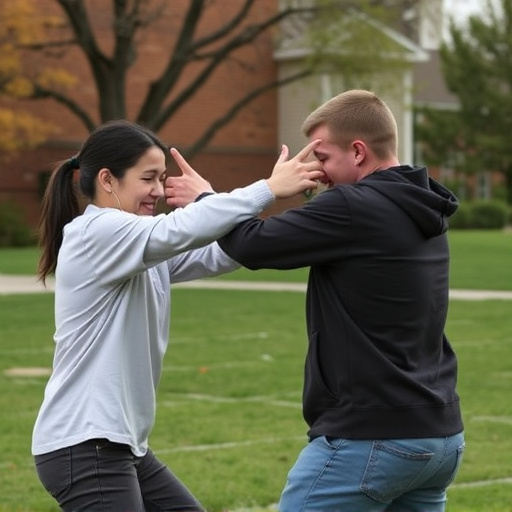For college students, self-defense is vital for navigating unfamiliar environments and enhancing personal safety. By learning simple yet effective moves, staying vigilant in well-lit areas, carrying safety devices, enrolling in classes, understanding campus security protocols, and building a supportive network, students can significantly reduce risks and boost their security. Utilizing campus resources and staying informed through official channels further empowers them to protect themselves and create a safer college experience.
College life offers an exciting journey, but personal safety is a critical aspect often overlooked. Understanding the unique self-defense needs of college students is the first step towards empowering them. This article explores practical strategies and valuable resources to enhance campus security. From awareness and prevention to building a support network, these measures ensure students are equipped to navigate their academic environment safely. Discover how implementing simple techniques and leveraging available tools can significantly improve personal safety for college students.
Understanding Self-Defense Needs of College Students
Practical Strategies for Personal Safety on Campus
Staying safe on campus is a top priority for all college students. Implementing practical strategies for personal safety can help mitigate risks and foster a sense of security. One crucial aspect is to be aware of your surroundings at all times. This means staying vigilant in well-lit, populated areas and avoiding dark alleys or secluded spots, especially after dusk. Carrying a personal safety device, like a pepper spray or an alarm, can be an effective deterrent and provide peace of mind.
Additionally, enrolling in self-defense classes is an excellent way for college students to empower themselves. Learning basic self-defense moves can help you protect yourself in unexpected situations. Familiarize yourself with campus security protocols and emergency procedures, including how to contact help and identify designated safe zones. Regularly updating your personal information and being cautious when sharing details online also contribute to a safer experience.
Utilizing Resources and Building a Support Network
College life brings a newfound sense of independence, but it’s crucial to prioritize personal safety. One effective strategy is to leverage available resources. Many colleges offer comprehensive security measures, including 24/7 emergency hotlines, campus patrol services, and even self-defense workshops tailored for students. Participating in these programs can empower you with valuable skills, enhancing your ability to navigate the college environment securely.
Building a support network is another vital aspect. Connecting with fellow students, joining safety-focused clubs or communities, and staying informed through official college channels can create a robust safety net. Sharing information about potential risks and reporting any concerning incidents fosters a culture of awareness and mutual protection. This collective approach to self-defense for college students strengthens the overall security of the campus community.
